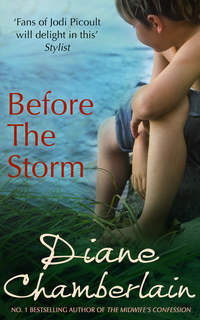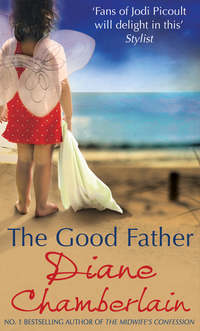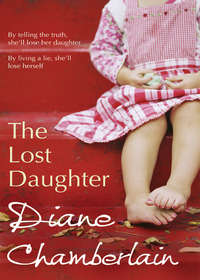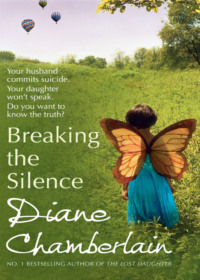
Полная версия
Kiss River
“I didn’t know that,” Gina said. “Thanks for the heads-up.” She stood, and so did he and Olivia. “And thanks for the help,” she said to Alec. “It was nice of you, especially since I know you’d rather I didn’t pursue this.”
Alec shrugged as he opened the front door for her. “You know there are other first-order lenses already on display, don’t you?” he asked.
“But they’re not the Kiss River lens,” she said with a smile. She stopped short as she walked through the doorway, and he followed her gaze to the small, oval-shaped stained-glass window to the left of the doorjamb.
“Oh, this must be Lacey’s,” she said, touching the glass image of a woman walking a greyhound.
“No, actually,” Alec said, “it was made by my first wife.” The oval window had been one of ten in the house he’d shared with Annie. When he and Olivia sold their separate homes to buy this one, it was Olivia who’d insisted he not leave all of Annie’s work behind. “You’ll regret it someday,” she’d said. He’d let her pick which oval window they should bring with them, not really caring at the time. But over the years, he’d been grateful to her for knowing he needed that little reminder of the good times with Annie.
“Oh,” Gina said. “I can see where Lacey got her talent.” She nodded to him. “Thanks again,” she said, then looked past him toward Olivia. “Nice meeting you both.”
“Nice meeting you, Gina,” Olivia said from behind him.
After closing the door, Alec walked over to where his wife was sitting on the sofa and leaned down to kiss her, but he knew the mood had long ago been broken. Bocelli was no longer singing, and most likely Olivia had blown out the candles when she left the bedroom. She returned his kiss, but then pulled away to look at him.
“The money is there to salvage the lens,” she said. “You know it is.”
He shook his head. “Olivia …”
“You could help her,” Olivia said. “No one knows the history of that lighthouse as well as you do.”
“No,” he said, letting go of her, standing up straight. “And please, don’t talk to me about it again.” He bent over again to kiss her lightly on the forehead, then turned to walk toward the kitchen, and if he hadn’t disliked the stranger the moment he’d opened his front door to her, he certainly did now. She had ruined his entire afternoon.
Chapter Seven
Saturday, March 14, 1942
MAMA AND I BAKED ALL MORNING, AS WE DO often on the weekend. Today was very cold for the middle of March and I was glad to have the oven heat up the house. I am so tired of going out to use the privy in the cold! This seems like the longest winter ever. First warm day we have, I’m taking off my shoes and not putting them on again until next fall.
Even though I spent all morning with Mama, we hardly talked at all. It is so hard for me to spend time with her. There is a wall between us. I want to hug her and tell her how much I love her and instead, ugly things come out of my mouth. Or nothing at all. We used to sing sometimes when we baked or cleaned together in the house. I can’t imagine that now. It’s not the war or anything like that. It’s ME. I feel like I have a mean guard up and can’t let it down for a minute around her. Can’t be soft. I don’t know why. Except that I am almost fifteen years old. I overheard Mama complaining about me to a friend at Trager’s Store when she didn’t think I was listening, and the friend said, “Oh, it’s just that she’s a teenager, Mary. She’ll grow out of it.” I hated being lumped together with all the teens in the world, but maybe she’s right. Though I can’t imagine growing out of this. Sometimes I miss having Mama’s arms around me, but when she touches me, I stiffen up, so who can blame her for not trying anymore? I can’t help it, though. Everything she ever says to me is “Don’t do this” and “Don’t do that.” There’s nothing much else to talk about.
Anyhow, we baked four pies and ten dozen cookies. It being so cold out, I didn’t want to leave that warm kitchen, but then I thought about the choice I had. Stay in the house with Mama, or take the pies to the Coast Guard boys. I didn’t have to think about that too long! I loaded the pies and cookies into the big wooden wagon we keep in the storage shed near the privy, hooked it up to my bicycle and took off down the Pole Road. None of the roads are paved around here. Even the Pole Road, the one used by the electric people to bring in equipment, is just a mess of sand and ruts and crazy curves and turns, but it’s the smoothest road there is for bicycle riding and carrying pies. If I was going to the Coast Guard building by foot, I would have just walked along the beach, although earlier this week we were told not to go out there because the bodies were washing up from that ship that sank last week. Most cars use the beach, too. They just follow each other’s tire tracks and go real slow, but one has to be dug out every once in a while. Ever since the U-boats started attacking us, the sandpounders (that’s what they call the Coast Guard boys) patrol the beach, watching for ships in distress and keeping a lookout for spies and for submarines letting Nazis off on the beach. The drivers of the cars have to give the patrollers a password to be able to go on. The patroller gives the driver a new password for him to use at the next stop, in another three miles, and people make their way up the beach like that. I wanted to have a password, too, when I go walking along the beach, but everybody knows me and they just say, “You go on ahead, now, Bess.”
I had to pedal real carefully because of the ditches and tree roots in the road, and I didn’t want to spill anything out of the wagon. It was so cold, I put my scarf right across my face to keep the wind out. Once I got there, though, I knew the trip had been worth it.
About half the boys were at the Coast Guard station, the other half out patrolling the beaches or maybe training their dogs or working at some other thing. When I walked in the door and took off my coat, I could see every head turn in my direction and smiles come to their faces, and I know it wasn’t just that I was pulling a wagonful of sweets. This is a new experience for me, having boys stare. My body feels different around them. My breasts are not all that big, but those boys stare at them all the same, even though I sure don’t dress to show them off. (I still had a sweater over my shirt, for Pete’s sake!) I could feel how my hips moved beneath my dungarees and how long my legs were. I’m nearly five foot eight now, the tallest girl in my school, although I guess with only thirteen girls from seven years old to seventeen, that’s not saying much. I’m taller than most of the boys at school, too. That’s why these older boys (men, really) from the Coast Guard look so good to me. Most of them are taller than me, some by quite a bit. My hair is brown, and up until last year I always wore it in braids, but lately I’ve been leaving it loose. It’s long and wavy and I can tell the boys like it that way.
So, some of the boys come up to me and started talking. Some of them talk so funny it takes me a minute or two to start understanding them, like last year when Mrs. Cady had us read a Shakespeare play out loud. My favorite accent is the one the Boston boys have. Teddy Pearson, who is from near there, said that Hitler should be “tod and fethahd.” I didn’t understand what he’d said until I was home in my bed that night, and I laughed out loud when I figured it out. Anyhow, they were all talking to me at once, asking me how I was, what kind of pie I’d brought, did I want to go out with them that night. You’d think they hadn’t seen a girl in months! If Mama could see how them boys act when I walk in the door of the Coast Guard station without her or Daddy, she would never let me go there alone again.
Jimmy Brown, another of the Boston boys, is my favorite of all of them at the station and not just because he’s the sandpounder who patrols the beach near Kiss River. Today, like always, he pretty much ignored me. That’s probably why I like him—he’s a challenge! Doesn’t drool over me and my pies when I walk in. He sat in the corner whittling something out of a piece of driftwood, looking up with those dreamy blue eyes every once in a while, smiling just a bit, though more at how crazy the boys were acting than at me, I think. So I chatted with all the boys, and with Mr. Bud Hewitt who came out to see what the racket was about, and all the while I had one eye on Jimmy Brown (he looks like Frank Sinatra!) whittling in the corner.
I would like the work they do. I wish they took women into the Coast Guard. I know the beach better than any of them, and would love to be out there at night, watching for danger. Mr. Hewitt told me that if I was a boy, I’d be the first person he’d recruit for the beach patrol. After all, some of those boys had never even seen the ocean before, much less know the beaches and the woods around them! I mentioned this to my parents one time and Mama just laughed at me, but I heard that she used to actually work with the lifesaving crew. She says that’s only a rumor, but even my father told me it was the truth and said that she doesn’t want me to know about it because it might give me ideas.
On the way home from the Coast Guard station, I bumped into Dennis Kittering. I was surprised to see him. He’s usually on the beach, not on the Pole Road, but he said he was just exploring a bit. I told him where I’d been and he said, “Why didn’t you bring me any pies?” I said, “I bring pies to the men who are fighting for our country. What exactly are you doing for the country?” Right away, I could have kicked myself. I forgot about his bum leg. He couldn’t go into the service because he has that one leg shorter than the other. I apologized and he smiled at me and said not to worry about it. He said he was teaching for his country, that’s what he was doing. Educating the next generation. Teaching them why the war was happening, helping them see why we should never let things get so bad again. I felt doubly awful when he said that. We stood there for a few minutes, with my bicycle and wagon between us, talking about The Heart Is a Lonely Hunter and that was fun. The truth is, there aren’t many people around here who understand much about the books I’m reading. Dennis thinks I’m real smart and that I should be a teacher when I grow up. That’s actually my plan. He says I need to get a better education than I’m getting here, though, if I want to be a teacher. I don’t know what it is about Dennis. He is nice and smart and mostly kind, but he irritates me to no end when he acts like he knows everything and I sometimes end up in a tiff with him. He corrects my grammar all the time, and when he criticizes my education, saying I can’t be getting a good one here with just twenty-three students of all grades and ages jumbled up together in one classroom out in the middle of nowhere, I get mad. I don’t like that he comes here all the time, saying how much he loves it and all, and then puts us Bankers down.
I made a stupid mistake and told him how I’d like to be a sandpounder and he laughed at that and said, “The sandpounders are men who have little else to offer the world. They are just a bunch of trigger-happy hooligans with guns, ready to shoot at anything that moves.” That really made me mad, although I’ve heard other people say the same thing about the patrollers. They just don’t know those boys and how serious they take their duty. Anyhow, see what I mean about sometimes getting into a tiff with Dennis?
He asked me if I want to go to church with him tomorrow. He goes all the way up to Corolla for church, where they have a Catholic service. I told him no, thanks. I always go with my parents to the Methodist church down in Duck. I don’t understand much about Catholics. Last summer, Dennis was wearing a short-sleeved shirt that was open a little at the neck and I could see he was wearing a necklace made of brown cord. I asked him about it, and he pulled it out and showed it to me. It had these two rectangles of wool attached to the cord, one that goes on his back and one on his chest, and they have pictures of Jesus and Mary on them. I don’t remember what the necklace is called, but he said he wears it all the time, that it makes him feel closer to God. Anyhow, when I said yesterday that I was going to the Methodist church, I was afraid he was going to start mocking my religion like he does my education, so I told him that I had to go home, I was late (which was true). I’ll take him a pie next weekend, to make up for being so rude to him.
I just realized that I’m starting to feel uncomfortable around Dennis. It’s not just the way he criticizes us Bankers, but it’s also that I know he looks at me different this year. He tells me I’ve gotten real pretty and actually said if I was a bit older, he would ask me to marry him! “You have potential,” he said. “I’d like to marry you and take you to High Point, where you could get a real education.” I admit I am flattered by all he says, but also I feel creepy, like I don’t want to be close enough to him for him to touch me. I think that’s why I wanted to keep my bicycle between us on the Pole Road. There was no one else around and it made me a little nervous. He’s not bad-looking. He wears glasses he looks nice in, and I like his dark hair. But he is ancient, eight years older than me, and I am definitely not interested in him as a boyfriend. Besides, I don’t like how “Bess Kittering” sounds. (I love how “Bess Brown” sounds, though!)
Mama scolded me when I got home. I stayed too long at the Coast Guard station, she said. I am supposed to just drop the pies off and leave, not stay and expect those boys to entertain me. I told her I was late because I met Mr. Kittering on the way home and we got to talking, and that made her even angrier. She thinks Dennis is strange to come out here every weekend. She’s never even met him, only seen him from a distance, and I told her how nice he is, how I like to talk about books with him, but she just kept yelling at me. I think Mama must have been born an old lady.
Chapter Eight
THE SUN WAS STILL HIGH IN THE SKY WHEN CLAY pulled into the short gravel driveway of the small cottage, which, like many other soundside cottages, was set on stilts above the water. Getting out of his car, he could see that the front gutter was a bit askew and a section of the deck railing was missing. He would have to spend a day over here soon working on those repairs and the other inevitable problems with this house that were not immediately visible. The old cottage took a great deal of his time—much like the old man living inside it. But these days, he loved nothing better than to fill up his time to the mind-numbing brim.
Standing on the front porch, he rapped his knuckles against the frame of the flimsy screen door, leaning close to peer inside the small living room of the cottage. Henry quickly appeared in the living room, obviously champing at the bit to get out of there. Clay pulled the screen door open, and the dapper old man stood in front of him, dressed in his usual white shirt and dark tie. He had to be the only Outer Banks resident who wore a tie every single day, Clay thought. With the exception of Henry’s three-day hospital stay after having his appendix removed, Clay couldn’t remember ever seeing him without one. Or without his hat.
“Hey, Henry,” he said, resting his hand on the man’s shoulder. “How are you doing?”
“Got ants in my pants.” Henry placed his straw fedora on his head and stepped onto the porch. He flexed his knobby, arthritic hands. “Need a good game of chess at Shorty’s,” he said, and Clay knew he’d been waiting all day for this outing. He wished now that he’d stopped his work on the cistern to pick him up earlier.
“What happened to the railing there?” Clay pointed to the spot where the two-by-four was missing.
“Woke up one morning and it was gone.” Henry shrugged his shoulders. “’Twas the day after I caught twenty-two crabs, so I think their pals must’ve up and took it to get back at me.” He chuckled. Henry could crab without even leaving his house. All he needed to do was walk around the deck and scrape the crabs off the pilings with a net. Even at seventy-nine, Henry could make some of the best crab cakes Clay had ever tasted.
“You be careful there,” Clay said, pointing to the railing again. “I’ll come over soon to fix it.”
Henry liked to boast that he lived in a house as old as he was. In theory, he was right. The house had been built sometime in the twenties. But it had suffered a massive fire in the forties, and flooding off and on over the years, with a bit of the house being replaced here, another bit there, until very little of the original structure still stood.
The old man still had a bounce in his step, and he walked ahead of Clay toward the car. He was lively and sharp-witted—and he was now Clay’s responsibility entirely.
Henry Hazelwood was Terri’s grandfather, and she had taken on his care as he’d aged. Her father, Henry’s son, had died four years ago, and her mother lived in California, so she had been the only relative nearby. She’d adored Henry, though, and had never complained about that obligation falling on her shoulders. Clay liked Henry, too, but at the age of twenty-nine, he had expected to be creating a family of little rugrats, not caring for an old man. He was all Henry had, though, and letting him down was not part of his nature. Henry’s eyesight was going, and he’d been wise enough to give up driving a couple of years ago. That meant that Clay frequently had to take time off from work to drive him to doctor’s appointments, the grocery store, and most important to the old man, Shorty’s Grill, where he could play chess and visit with his old friends, Walter Liscott and Brian Cass.
The one thing about Henry that Clay simultaneously loved and hated was that he reminded him of Terri. Both Terri and her father had had a slant to their eyebrows above steel-gray eyes, and those features were mirrored in Henry’s face. Clay saw his wife there every time he looked at his grandfather-in-law.
“What did you do this morning?” Clay asked once they were in his car and crossing the island to the beach road.
“What do you think?” Henry asked him.
“Crabbed?”
“What else?” Henry chuckled again. “Snared my dinner. And how about you?”
“Oh.” Clay sighed. He was always caught off guard when Henry asked him about himself. “I worked on the cistern.”
“Sounds like a better use of time than catching crabs,” Henry said.
Clay smiled. “Can’t eat a cistern, though.”
Henry chuckled, and they both grew quiet. Henry was a man of few words. Any conversation between them was usually short and to the point, and that was fine. They had never, not once, talked about Terri. That was fine, too. Clay didn’t talk to anyone about Terri.
He had rejected his father’s suggestion that he see a therapist after Terri died. What could a therapist do? He—or she—couldn’t bring her back. Clay kept his dark thoughts and deepest feelings under wraps, throwing himself into his work, killing time more than filling it. The world thought he was doing fine. He stayed active and he made sure his spirits seemed up around his friends. Lacey was probably the only person who knew he wasn’t the jovial sport he pretended to be. He was around her too much to keep up the act, and he knew she was struggling to find a way to save him, the way she would save a stray kitten. Or a wandering lighthouse historian.
At breakfast that morning, he could see his sister looking from Gina to him and back again, hope in her conniving blue eyes that he would find the newcomer attractive. Well, he did find her attractive, but that only added to his problems, and he hoped Lacey wouldn’t try to push him too hard. He supposed she needed to focus on some new deficiency in him since she’d failed at getting him back into search and rescue work. He felt sick at the mention of those words: search and rescue. Literally sick. The other night, he’d had to turn off the television when a newscaster mentioned a search and rescue team involved in an earthquake in some other part of the world, the wave of nausea sending him to bed. Lacey had been in the room at the time, and she’d said nothing when he turned off the TV and went upstairs. A few months ago, she would have followed him up, trying to get him to talk. But she was learning. She no longer badgered him to open up about his feelings. One of these days, she would give up trying to save him. He was destined to be her one failure.
“Looky there!” Henry pointed in the direction of a new fish market on Croatan Highway. “We’ll have to try that one.”
“Looks like a good one,” Clay said.
Henry had lived on the Outer Banks forever, since being stationed there during the Second World War. He’d fallen in love with a Banks girl and married her, a union that produced one child, Terri’s father. The Outer Banks had grown up around him, but he never complained the way a lot of the old-timers did. He never talked about what things had been like in the old days, or grew crotchety over how crowded it was in the summer or griped about the tourists who acted as if they owned the place. He actually seemed to like the overgrowth of buildings and stores and restaurants that disturbed many of the natives. He’d spend hours in the supermarket, still amazed by all the choices, reading the labels on the frozen foods, which he loved. Clay had learned to bring a book with him when he took Henry shopping; otherwise, he would go out of his tree with boredom. Henry loved his TV dinners, but he had to have fresh seafood as well, so Clay took him to the fish market a couple of times a week. Now that Henry had spotted this new store, he knew it wouldn’t be long before he found himself leaning against the interior walls, reading his book, while Henry took his time sniffing the fish.
Clay had learned of Terri’s death on a Tuesday in late November, and his own shock and horror had been compounded by his need to tell Henry. Henry had already lost his wife and only son. To lose his beloved granddaughter as well seemed a cruel injustice. And Clay couldn’t tell him. It had been Lacey who went over to the rickety soundside cottage to give Henry the news. Clay never asked his sister how the old man took it; he didn’t want to know. All he knew was that, for the next few weeks, every time he picked up Henry to take him someplace, the elderly man’s eyes would be as red as Clay’s own.
They pulled into Shorty’s crowded parking lot. Shorty’s was a dive—there was no other word for it—and somehow the tourists knew to stay away. A few ventured in, those people who thought they’d find a taste of the old Outer Banks in the ramshackle building, but most of them were there only a few minutes before realizing they would never truly fit in. Especially not in the back room.
The back room, which was in reality on the side of the building, was a hangout for fishermen, weathered old-timers and young men with too much time on their hands. There was a battered pool table on one side of the room and chess and checker boards and decks of cards scattered across the tables. Two dartboards hung on the walls. The windows were filmed with years of smoke. An occasional woman or two could be found in the back room. They usually hung around the younger men, playing pool, displaying varying degrees of cleavage as they leaned low over the table and maybe a tattoo of a rose on one shoulder. It was those women, their skin tanned to the color and texture of leather, who were often the smokers.
Kenny Gallo, whom Clay was to meet for a beer, was not yet in the restaurant, so he walked with Henry into the back room to deliver the old man to his friends. A couple of women were playing pool with a guy who had only recently become a regular, a dark-haired young man of about twenty who was elaborately tattooed all the way from his knuckles to the place where his arms disappeared beneath the sleeves of his black Grateful Dead T-shirt. The women looked up when Clay entered the room. He felt their eyes stay on him as he and Henry moved toward Walter Liscott and Brian Cass and the chessboard. He was as indifferent to their attention as he was accustomed to it.









